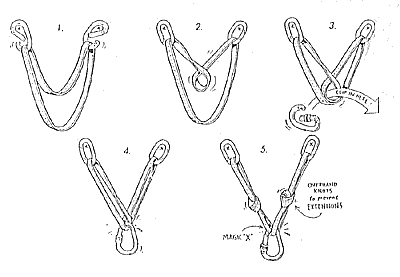Building Top Rope Anchors
Good top rope anchors have strong bases such as bolts, strong trees, or boulders that won't move. Fix the rope to the base using cordelettes, slings, or carabieners. It is important to use more than one anchor point to secure your rope, so that if one point fails, the other point will catch the climber. BAD! If this sling breaks the climber will fall. |
 Good! If one sling breaks, the other will catch the climber. |
Equalizing
It is important to equally distribute weight across the anchor point, so that there is not more force acting on one point relative to another.
 This anchor is equalized |
* However, if the climber starts climbing more to one side more weight will be applied to one of the points, which could cause failure. |
 http://www.hapaet.com/onrope/anchor_equalizing_forces.gif |
| The "Magic-X" is a self
equalizing knot, make a loop with the top strand and then
clip your carabiener through the loop and the bottom strand. |
Some Bad Ideas
|
C B A |
Instead of equally distributing
forces this triangle increases the forces exerted on the bolts.
There is force being applied in the downward direction along sides A
and B, which creates a tension along side C. This tension
increases the force on the bolts. |
||||||
| This is an equalized anchor, but
if any part of it fails the climber will fall. If one of the
carabieners fail the rope will slide of the sling, If the sling fails
the rope will fall. |
 * * |
Some Good Ideas
Back up your anchors, add an extra sling to your anchor point and to the rope. Use as many anchor points as possible. Do not for get to EQUALIZE!
